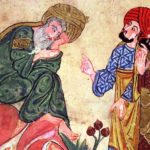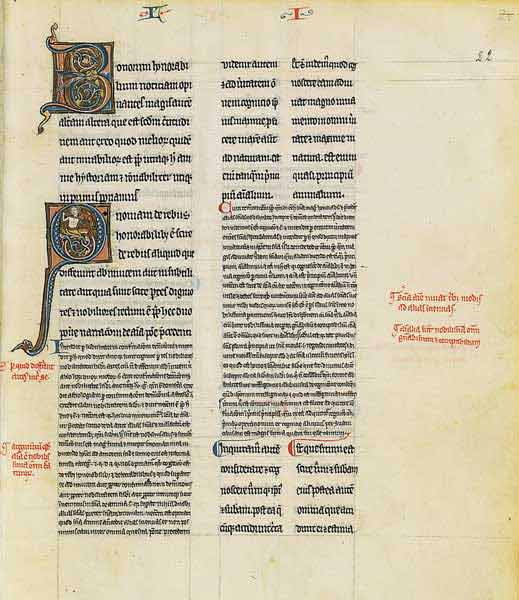
In dealing with this problem, Ibn Rushd went as far as penning an independent essay, and designated for it three independent works that are some of his most distinguished philosophical productions: The Decisive Treatise, determining the nature of connection between Religion and Philosophy [1]; Uncovering the Evidential Methodology in the Beliefs of the Religion [2] and The Incoherence of the Incoherence [3].
THE READER OF THE ABOVE three texts will observe some important features that can be summarized as follows:
- These texts constitute a broad discourse addressed to the general public and an audience in the first place of scholastics and jurist. He relies on presenting his views on terminology and the jurisprudential and scholastic approach. He sets as his task to resolve a number of important controversial issues, the most pressing of which is the necessity for the rational and philosophical view as one that is a collective duty, that is, a socially obligatory tool for those who possess the conditions for intellectual reflection and who are familiar with logic and its tools of analogy and proof.
- Ibn Rushd did not express opinions that contradict what he stated in his own philosophical works, nor in his commentaries on the opus of Aristotle. He also stuck to a strict approach from which he never at any point deviated – one of his rules being that the discourse should be pitched at the level of the audience, and that the truth is always the same and that any differences that people express in their perception is a matter of detail and degree, not of essence. For example, what a simple person understands about cleanliness is that it is necessary and a condition of safety; but what the doctor understand by it is why it is necessary. The difference here between the two types of knowledge is one of degree and detail, and not something essential.
- The language of Ibn Rushd’s discourse here is a ‘language of attack’ not a language that seeks appeasement or the affection and indulgence of the clerics or whoever puts himself forward as some guardian of the faith.
- The stated purpose of writing these three books is to reform people’s understanding of the Sharī‘a after it had become corrupted by theologians with their misleading and tainted interpretations which, in his view, were the main cause of disagreement among people and their division into sects and denominations that looked upon other as infidels, to the point of tearing the Nation apart and weakening it, all of which encouraged other nations to rally against them and wage wars and occupy their lands, such as the European campaigns of his time against the countries of the East and their interventions in the petty sectarian states in the Maghreb.
These four observations confirm to us Ibn Rushd’s awareness of the depth of this problem, how deep it had become rooted in Arab-Islamic culture and the extent of its ideological exploitation by numerous intellectual trends, in addition to the errors committed by some philosophers, such as Al-Ghazali, in providing an epistemological foundation for the problem.
That the results of this were not what Al-Ghazali had intended is clearly stated by Ibn Rushd in the introduction to his book Exposition on Evidential Methodology, where he says:
The first to adulterate the medicine were the Kharijites, then the Mu’tazila after them, then the Ash’aris, then the Sufis, and then Abu Hamid al-Ghazali followed them and ‘made the valley flood over the villages’ by blurting out to the masses all this knowledge and opinions of the sages, as far as he understood it.[4]
Al-Ghazali’s mistake, according to Ibn Rushd, was that he presented highly nuanced philosophical issues to the masses who were simply not qualified to understand them. This resulted in people dividing themselves up into those who vilified philosophy and accused those who practice it as being infidels, or those who sought deeper ‘interpretations’ of the Sharī‘a tp present this as ‘wisdom’ and this, in his view, was all wrong.[5]
Ibn Rushd proves the necessity of rational enquiry as a socially obligatory, collective duty for the expert
Ibn Rushd begins his treatment of this issue by answering the question: Is the rational view, are philosophy and logic commanded by Sharī‘a or prohibited by it?[6] He answers it by first defining what philosophy is, which is
examining things that exist and considering them as evidences of their Maker
– that is, in terms of what are the artifacts that indicate the existence of the Maker or ‘Artisan’, and the more complete the knowledge of these, the better and more complete the knowledge of the Maker will be. The Sharī‘a, according to Ibn Rushd, actively urges contemplation of the things that exist and to knowledge about them in many texts of the Holy Qur’an. Ibn Rushd presents a number of Qur’anic verses that support this proposition, and then moves onto another stage, to prove the need for logic and to establish that on a legal Sharī‘a basis, on the grounds of the Almighty’s statement:
So consider, O ye who have eyes![7]
‘Consideration’, according to its definition, means: deriving the unknown via the known, and extracting it therefrom.[8]
This is the meaning of analogy, which Ibn Rushd considers the most important means of rational enquiry, and the best or most complete type of analogy is demonstrative analogy (al-qiyas al-burhani). For this, Ibn Rushd considers it necessary for the seeker of knowledge to progressively deepen his knowledge of analogy, of its types and conditions, including this demonstrative analogy. He responds to those who consider philosophy a heresy unknown to the first generation of Muslims by saying that most of the religious sciences, including jurisprudence, were not known to the first generation, but that the need for them promoted their development.
Ibn Rushd points out that these sciences are the product of strenuous, concerted scholarly efforts by nations, and therefore does not see any harm in seeking the help of the sciences of the early, pre-Islamic scholars, even if they disagreed with us in religion, because theirs were neutral sciences, much like any instrument that we care to use.

Suggested Reading
After that Ibn Rushd proves the necessity of rational enquiry as a socially obligatory, collective duty for the expert and elite scholars, and demonstrated that scholars and philosophers have the right to carry out ijtihad (individual legal reasoning) in existential matters, and rejected al-Ghazali’s accusations against philosophers and his declaration of them as infidels in three treatises: The question of the world’s eternity and origin, The question of God’s knowledge (does it encompass universals and particulars or only universals?) and The question of the Final Gathering and the nature of the next life. He emphasized that there was no consensus among Islam’s scholars on these issues and that the mujtahid who examines them does not step beyond the circle of faith – which Ibn Rushd defined as: faith in God, His Books, His Messengers, in the Last Day, and in the reward or punishment in the Hereafter.
In his work Uncovering the Evidential Methodology, Ibn Rushd sought to complete his earlier thesis after he had confirmed the permissibility of rational and philosophical enquiry, by criticizing the approach taken by theologians, mystics and the philosophers who preceded him. He then presents his own, new approach represented by the law of interpretating the religious text. We will postpone talking about his criticism of theological and philosophical schools to a later date and conclude our discussion on this issue of reconciling his law of interpretation.
[1] Arabic title: كتاب فصل المقال وتقرير ما بين الحكمة والشريعة من الإتصال. Ibn Rushd argued that philosophy—which for him represented conclusions reached using reason and careful method—cannot contradict revelations in Islam since they are simply two different methods of reaching the Truth, and ‘truth cannot contradict truth’. When conclusions reached by philosophy appear to contradict the text of the Revelation, then according to Ibn Rushd, Revelation must be subjected to interpretation or allegorical understanding in order to remove the contradiction. (Ed.)
[2] Arabic title: كتاب الكشف عن مناهج الأدلة في عقائد الملة a refutation of the Ash‘aris.
[3] Arabic title: كتاب تهافت التهافت. The work is a response to Al-Ghazali’s The Incoherence of the Philosophers (Tahafut al-falasifa), a scathing and influential critique of the Neoplatonic philosophical tradition in the Islamic world and against the works of Avicenna in particular. Among others, Al-Ghazali charged philosophers with non-belief in Islam and sought to disprove the teaching of the philosophers using logical arguments. (Ed.)
[4] Ibn Rushd, الكشف عن مناهد الإدلة, p. 150-151.
[5] Ibn Rushd, Op. cit, p. 151.
[6] Ibn Rushd, فصل المقال p. 37.
[7] Qur’an LIX (al-Hashr), 2.
[8] Ibn Rushd, فصل المقال, p. 38.
Main image: Ibn Rushd (Averroes) as depicted in the fresco The School of Athens by the Italian Renaissance artist Raphael. The fresco, featuring philosophers, mathematicians, and scientists from Ancient Greece, was painted between 1509 and 1511 as a part of Raphael’s commission to decorate rooms in the Apostolic Palace in the Vatican.

